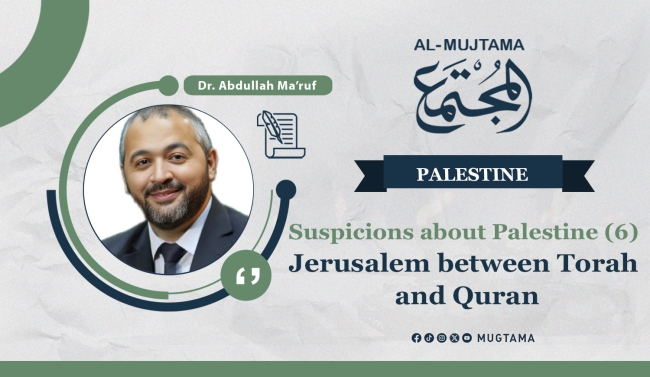Suspicions about Palestine (6) Jerusalem between Torah and Quran Featured
It is impossible to forget that day when the occupation Prime Minister Benjamin Netanyahu, with his known arrogance, denied the Muslims' connection to Jerusalem, declaring it sacred in Judaism because it is mentioned in the Torah six hundred times, while it has not been mentioned in the Quran even once! The strange thing is that ever since I heard this phrase from Netanyahu on television, I was surprised to find some Arabs repeating it shamelessly, especially those who promoted what is known as the "Abraham Accords" at a certain stage.
In fact, this suspicion is considered one of the most naively simplistic misunderstandings from a scientific standpoint, as it relies on quantity to determine sanctity. It also depends on the assessment of the quality of the sole source of laws by those who are not part of this creed, and both of these matters are scientifically illogical.
As for the aspect of numbers, mentioning something by its name does not imply its sanctity in sacred texts. For example, Hell is mentioned in the Holy Quran 77 times; does that make it a holy place? Egypt is mentioned by name in the Quran five times, even though Egypt has never been a holy land nor is it granted any special sanctity in Islam. In contrast, Mecca, which contains the sacred sanctuary of Allah Almighty, is mentioned in the Quran by name only once and once more as "Bakkah." Additionally, the city (meaning the city of the Messenger of Allah, peace be upon him) is mentioned four times. This did not make Egypt sacred, nor did it elevate the city to a status greater than that of the Holy Mecca. Egypt itself is mentioned in the Torah 607 times, in comparison to 600 times for the name of Jerusalem according to the search methodology in the Tanakh (the text of the Torah) (1). Does that mean that Egypt is more sacred in Judaism than Jerusalem itself based on this reasoning?!
As for the source, the primary sources of the Jewish religion are the Torah and its explanations (the Mishnah and the Gemara, collectively known as the "Talmud"), and this is something that is not disputed among Jewish religious scholars. However, when it comes to Islam, I see many who emphasize the Noble Qur'an as the only primary source in the Islamic religion, while neglecting the authentic Prophetic Sunnah. This is a methodological error that even some Muslims who oppose the Prophetic Sunnah today fall into. I am not here to discuss the "Qur'anists"; rather, the Noble Qur'an and the authentic Prophetic Sunnah are the two original sources of legislation in the Islamic religion. It is not surprising to find references of reverence and sanctity to Jerusalem and its surroundings in many verses of the Qur'an and authentic Hadith, which amount to over nine hundred occurrences in both the Qur'an and the Sunnah. So even if we were to consider the argument of quantity— which should not be the basis for judgment as we have previously discussed— the followers of this argument would not be able to surpass the Islamic texts.
The distinctive feature of the issues related to mentioning Jerusalem, the holy land, and the land that Allah blessed in the Holy Quran and the noble prophetic Sunnah is that all the instances in which this pure land is mentioned are done with reverence, sanctity, and praise. This is because the Holy Quran and the noble prophetic Sunnah are religious texts; they do not mention matters merely for the sake of mention. Islam is concerned with quality, not quantity, and this is the miracle of the Holy Quran, which conveys profound meanings with the least number of words.
As for the biblical texts referred to by these individuals, most of them are popular stories and narratives mentioned during the rewriting of the Babylonian Torah by Ezra, as is well known. Therefore, we find that they do not go beyond mentioning events here or stories there, which does not grant the place any special significance or sanctity unless its mention is accompanied by virtues, as is the case with the Noble Quran and the honorable Sunnah.


